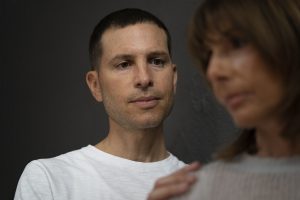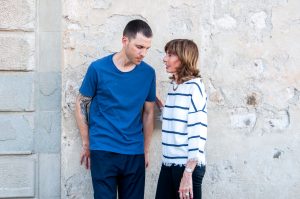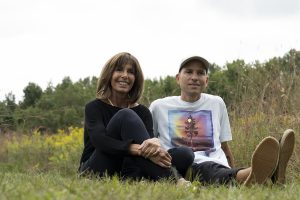 A young girl, with a crystal meth addiction, wrote to me: I am addicted again. It’s been two years since l relapsed. I am convinced everyone hates me. I constantly hear voices that tell me that they will kill me, I’m ugly, I’m disgusting or that l smell. Some days I have eight showers and other days it takes all day to have one. Most days, I don’t trust the water out of the tap. I can’t talk with my mom – I’m afraid the stress will kill her. My lifelong friends and family have nothing to do with me. I abuse my mom day and night, and I hate myself for this.
A young girl, with a crystal meth addiction, wrote to me: I am addicted again. It’s been two years since l relapsed. I am convinced everyone hates me. I constantly hear voices that tell me that they will kill me, I’m ugly, I’m disgusting or that l smell. Some days I have eight showers and other days it takes all day to have one. Most days, I don’t trust the water out of the tap. I can’t talk with my mom – I’m afraid the stress will kill her. My lifelong friends and family have nothing to do with me. I abuse my mom day and night, and I hate myself for this.
My reflection: What struck me most in reading this girl’s message was that, even in the midst of writing these rambling and tragic sentences, she is concerned about her mother. She loves her and doesn’t want to hurt her.
Today’s Promise: Our suffering loved ones often act in uncaring, selfish, manipulative, and abusive ways. While this might be true, as long as they are alive, they still exist underneath the disease. Their empathy and humanity are buried deep within as they grapple with their own demons. I will remember this as I stay close, but out of the chaos of her addiction.



 A dad wrote: I have worked so hard on forgiveness. I have prayed for His Spirit to grant me the gift of forgiveness. I must somehow still be resistant. I sometimes, in prayer, feel I have forgiven, then the past comes back to haunt me and the anger and remembrance of betrayal returns and I am back where I do not want to be. Share with me, how do you forgive and stay in forgiveness?
A dad wrote: I have worked so hard on forgiveness. I have prayed for His Spirit to grant me the gift of forgiveness. I must somehow still be resistant. I sometimes, in prayer, feel I have forgiven, then the past comes back to haunt me and the anger and remembrance of betrayal returns and I am back where I do not want to be. Share with me, how do you forgive and stay in forgiveness? A mother wrote to her son:
A mother wrote to her son: Therapist Francis Weller writes: Grief and loss touch us all, arriving at our door in many ways. It comes swirling on the winds of divorce, the death of someone dear, as an illness that alters the course of a life. Left unattended, these sorrows can seep underground, darkening our days. This requires finding meaningful ways to speak of sorrow. It requires that we take up an apprenticeship with sorrow. Learning to welcome, hold, and metabolize sorrow is the work of a lifetime.
Therapist Francis Weller writes: Grief and loss touch us all, arriving at our door in many ways. It comes swirling on the winds of divorce, the death of someone dear, as an illness that alters the course of a life. Left unattended, these sorrows can seep underground, darkening our days. This requires finding meaningful ways to speak of sorrow. It requires that we take up an apprenticeship with sorrow. Learning to welcome, hold, and metabolize sorrow is the work of a lifetime. A mom wrote to me: I remember my son saying two things to me about relapse:
A mom wrote to me: I remember my son saying two things to me about relapse: A son of alcoholic parents wrote to me: My parents struggled with alcoholism for most of their adult lives. Alcohol was a curse on my family, but we learned to “stay close” and support one another. My parents were in pain. It is not our place to judge.
A son of alcoholic parents wrote to me: My parents struggled with alcoholism for most of their adult lives. Alcohol was a curse on my family, but we learned to “stay close” and support one another. My parents were in pain. It is not our place to judge.  A dad wrote to me, I followed my heart, my natural parental instincts fueled by love. My twenty-one years of experience and education dealing with my son’s addiction have allowed me to forgive myself. What others consider as parent mistakes are simply necessary experiences that must be encountered in order to understand the disease and, therefore, to begin a successful journey to personal recovery, which will include the necessary tools to appropriately support the child’s recovery.
A dad wrote to me, I followed my heart, my natural parental instincts fueled by love. My twenty-one years of experience and education dealing with my son’s addiction have allowed me to forgive myself. What others consider as parent mistakes are simply necessary experiences that must be encountered in order to understand the disease and, therefore, to begin a successful journey to personal recovery, which will include the necessary tools to appropriately support the child’s recovery. A mother wrote to me: My son died of a heroin overdose. I need to forgive myself for all the mistakes I made. I try to understand why he couldn’t just stop what he was doing to himself. It isn’t as simple as people want to make it. I live with the pain of not being able to help my son when he needed it, but I get up everyday and try to live my life the best I know how. I still feel that I hide from so many people who can’t understand what it was like to live with a son I loved and couldn’t help before it was too late.
A mother wrote to me: My son died of a heroin overdose. I need to forgive myself for all the mistakes I made. I try to understand why he couldn’t just stop what he was doing to himself. It isn’t as simple as people want to make it. I live with the pain of not being able to help my son when he needed it, but I get up everyday and try to live my life the best I know how. I still feel that I hide from so many people who can’t understand what it was like to live with a son I loved and couldn’t help before it was too late.
8 Comments.
View Comments | Leave a Comment